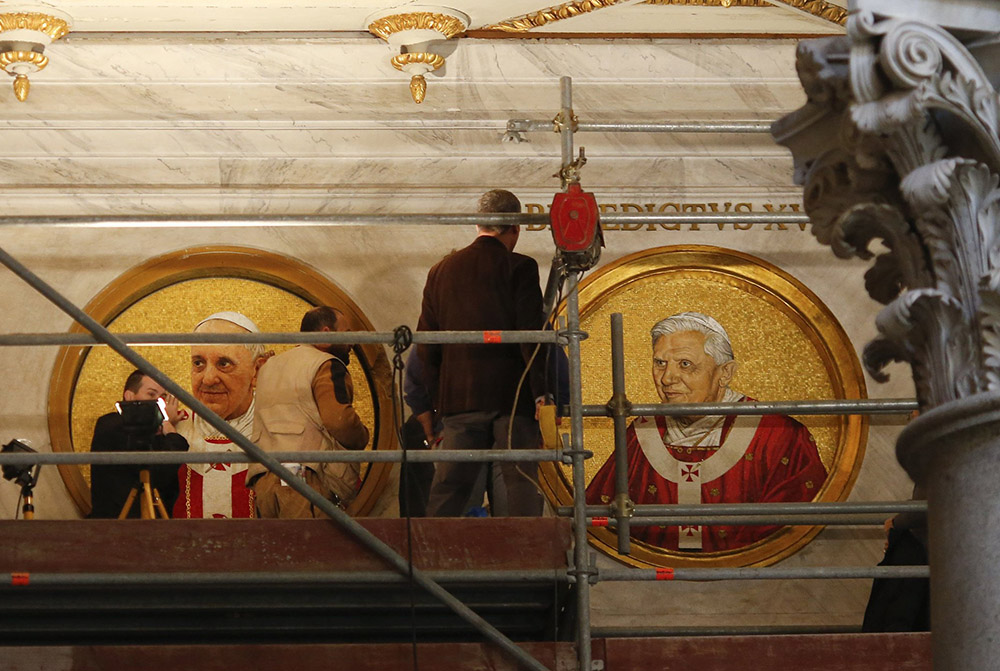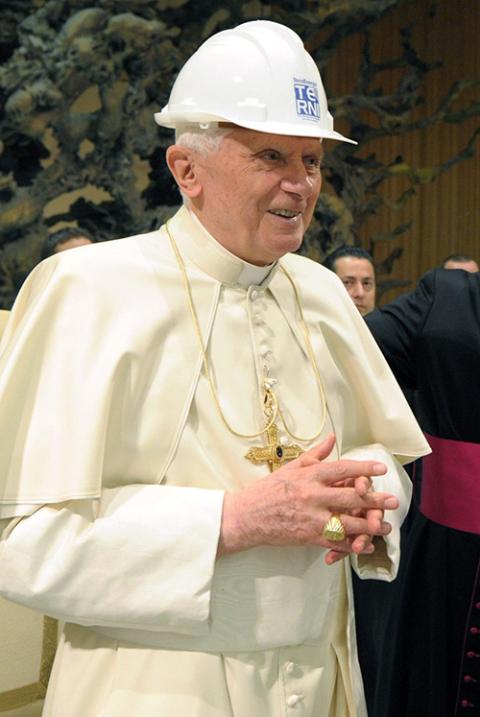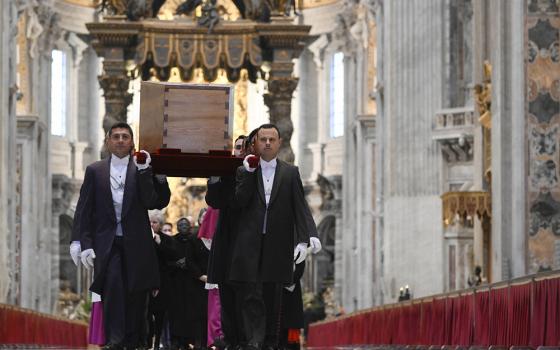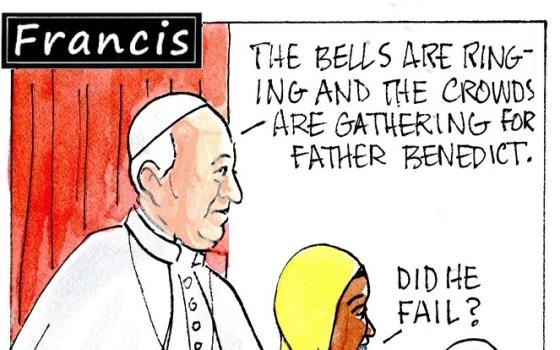
Pope Benedict XVI signs a copy of his encyclical Caritas in Veritate ("Charity in Truth") at the Vatican July 6, 2009. (CNS/L'Osservatore Romano via Reuters)
The myopia of American Catholics has been on full display this week as they rush to canonize or demonize the late Pope Benedict XVI, and to contrast his time as pope with that of the current pontiff, Pope Francis.
Raymond Arroyo was on Fox News explaining, "We needed his voice, his clarity, especially now." The "now" implies a contrast with what conservative Catholics have complained is the "confusion" of Francis' pastoral style.
"You might say this is the definitive drawing down of the curtain on Vatican II," said Bishop Robert Barron of Winona-Rochester, Minnesota. You might, but you would be wrong. Barron seems not to realize that the universal church is in the midst of a synodal process that is, in its essence, about continuing the reception of Vatican II.
Ross Douthat, in The New York Times, opined that Benedict's resignation backfired:
What the resignation yielded, though, was not what Benedict had presumably expected ... the Francis pontificate was quickly defined by a sweeping push for liberalization, a striking shift of personnel and policy and a reopening of many of the 1970s-era debates that Benedict had tried to settle.
Yes, there have been some changes in personnel, and Francis, a pastor with a keen theological mind, approaches some issues differently from the way Benedict, a theologian with a pastoral heart, did.
What these three conservative voices miss is that for all the differences of style and approach, all popes do their best to articulate a Catholic response to the challenges of their times, not a liberal or conservative one. These would-be defenders of the Ratzingerian legacy ignore the obvious points of continuity between Benedict and Francis.

Workers install a mosaic depicting Pope Francis next to the one depicting Pope Benedict XVI in St. Paul's Basilica in Rome Dec. 9, 2013. (CNS/Reuters/Alessandro Bianchi)
Nowhere is that continuity more obvious than in the area of Catholic social teaching. Benedict "pushed the tradition forward on both ecological and economic justice," Meghan Clark, a theologian at St. John's University, told me via email.
"Caritas in Veritate may be an overly dense document, but it provides a clear bridge from John Paul II's cautions about unfettered capitalism and Francis's exposing structures of inequality and exclusion," she said. "What prompted George Weigel to rant about red and gold pens, at the core, was that."
Clark was referencing Weigel's criticism of Benedict's 2009 encyclical, Caritas in Veritate, in which Weigel tried to minimize certain themes in the text by suggesting Benedict had not really written them.
What becomes clear, as Italian theologian Massimo Borghese demonstrated in his book Catholic Discordance is that Weigel, joined by fellow neoconservatives Richard John Neuhaus and Michael Novak, tried to suggest Pope John Paul II was charting a new course in his 1991 encyclical Centesimus Annus. That text included a couple of paragraphs praising contemporary market economics for which the trio claimed credit. They hoped that section might have proven seminal. Instead, Benedict's Caritas in Veritate firmly shut the door on any doctrinal development along neoconservative lines.
Clark also points to another area where Benedict's writings resonated especially with those on the Catholic left.
"American Catholics struggle with the relationship between charity and justice," Clark said. "Charitable work is important but it is no substitute for building a more just society. Benedict XVI 's Caritas in Veritate provides no quarter for those who think charity or philanthropy are a sufficient response to injustice: 'I cannot give what is mine to the other, without first giving him what pertains to him in justice.' "
Anthony Annett, author of Cathonomics: How Catholic Tradition Can Create a More Just Economy, said Americans need to appreciate Benedict's past as a person who grew up in postwar Germany to understand his perspective.
Advertisement
"Benedict came of age as the German postwar 'social market' economy was being put in place. This was a core pillar of Christian Democracy, and it had its roots in Catholic social teaching," Annett explained to me via email. "It was therefore natural for the state to protect people from the vagaries of capitalism and to give workers the power to bargain collectively. A distinctive feature of the German Christian Democratic order is the emphasis on codetermination — this is where workers share in the management of the enterprise, including by having seats on boards of directors. This was made possible by the German constitution's insistence that property has a social role — an insight that goes back to Thomas Aquinas."
The tea party Catholics may not be able to make sense of this bit of history, but they cannot ignore what Benedict said in 2006 in Without Roots, a book he co-wrote with Marcelo Pera: "In Wilhelmine Germany, too, Catholic groups felt closer to democratic socialism than to the rigidly Prussian and Protestant conservative forces. In many respects, democratic socialism was and is close to Catholic social doctrine and has in any case made a remarkable contribution to the formation of a social consciousness."
Is that the "clarity" Arroyo pines for?
This historical insight helps correct two misinterpretations of Catholic teaching and the Ratzingerian legacy made by conservative American Catholics.
First, while it is true that, as prefect of the Congregation for the Doctrine of the Faith, Cardinal Joseph Ratzinger issued two notes on liberation theology, the critique was not about Marxist economics but about lousy Marxist anthropology.
What many conservative Americans would consider "socialist" would have been normal and acceptable to the German cardinal, quite distinct from the problems with Marxist determinism and ideas of class conflict he identified in liberation theology.
Second, Benedict, like all popes, saw unions as central to the creation of a just economy. This disposition clearly escapes the attention of some Catholic conservatives. In early 2018, when the U.S. bishops' conference issued an amicus curiae brief supporting the rights of public service workers to unionize, Ed Whelan, then-president of the Ethics and Public Policy Center, criticized the brief on various grounds, none of them consistent with the text or context of Catholic social teaching about unions.
Annett also sees Benedict's contributions to social teaching as paving the way for Francis.
"Benedict was steeped in Catholic social teaching and in many ways paved the way for Francis," Annett said. "We can see this in two ways. First, Benedict's environmentalism — he was known as 'the green pope' — set the scene for Laudato Si'. And in Caritas in Veritate, Benedict argued that economic life must be seasoned by fraternity and gratuitousness — a theme developed by Pope Francis in Fratelli Tutti. Overall, Caritas in Veritate's call for a re-imagining of the economic order is radical in the truest sense of that word."
University of San Diego theology professor Victor Carmona highlights a different aspect of Benedict's legacy.
"Although Benedict XVI's legacy is complex, his writings contributed a helpful remedy to heal some of the effects of the culture wars that have seeped into the life of the church in the U.S.," Carmona told me in an email.
"His constant affirmation of secularity — the rightful autonomy of the political sphere from the ecclesiastical one — offered an essential ground for making faith-based claims in defense of human rights, particularly those of immigrants, refugees, and asylum seekers," said Carmona. "It helped push back against the presumption by some on the left that faith-based claims have no place in the public square because they uncritically advance the bishops' agenda or against those held by some on the right that faith-based claims only prioritize their agenda."
Links between Benedict and Francis extend beyond the specific focus of Catholic social teaching. At his new website, On Polity & Faith, political philosopher Stephen Schneck argues that Francis relies heavily on Benedict's interpretation of modernity. All popes, starting with Leo XIII, have raised some of the same concerns about modern notions of individual autonomy and state overreach.
For example, consider this papal quote: "While the poor of the world continue knocking on the doors of the rich, the world of affluence runs the risk of no longer hearing those knocks, on account of a conscience that can no longer distinguish what is human." Which pope said it? Benedict, in Caritas in Veritate.
Those who try to enlist the late pope as an avatar of conservatism sometimes do to him what they did to John Paul II: They distort the record. American conservatives do not put much stock in Catholic social teaching. (Some liberal Catholics get it wrong too, but that is a different story.)
There is no denying Benedict was conservative in basic ways, and in ways that Francis is not. They are very different persons with very different life experiences. Benedict always seemed to see the cloud first while Francis sees the silver lining. More important than their differences, however, is their shared faith. Both are Catholic first, and both are men of Vatican II. All other qualifying adjectives follow, they do not lead, except among myopic American commentators.







